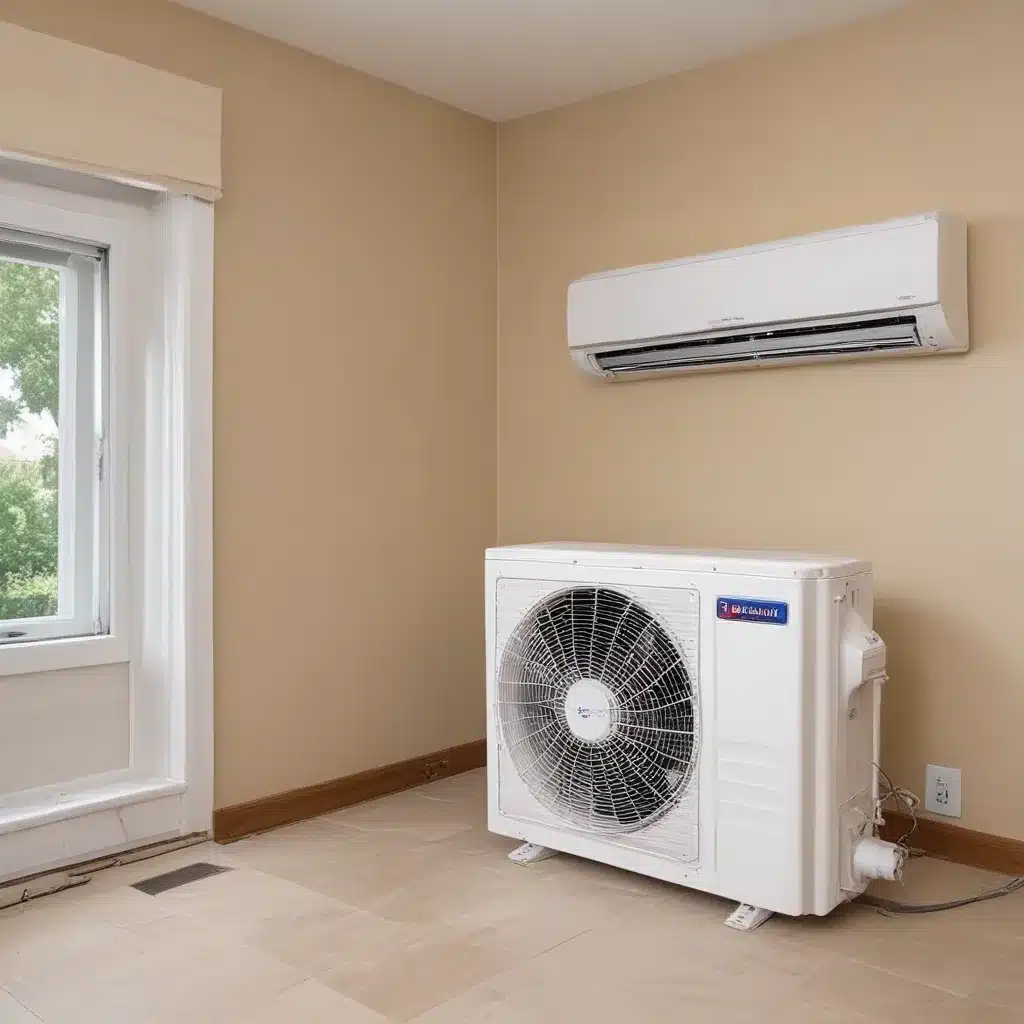
As an experienced HVAC specialist writing for US Air Contractors, I’m excited to share insights on a cooling solution that’s growing in popularity – ductless mini-split systems. We learned this the hard way when dealing with complex HVAC issues… These innovative systems offer a flexible and energy-efficient alternative to traditional air conditioning, making them an attractive option for homeowners, businesses, and building managers seeking to beat the heat while maximizing comfort and cost savings.
Ductless Mini-Split Systems: The Future of Cooling
Ductless mini-split systems, also known as ductless air conditioners or mini-splits, are a type of HVAC technology that is particularly well-suited for spaces where installing ductwork is impractical or cost-prohibitive. Unlike central air conditioning systems that rely on a network of ducts to distribute cool air, mini-splits consist of an outdoor compressor/condenser unit connected to one or more indoor air-handling units via small refrigerant lines.
The key benefit of this setup is the flexibility it provides. Each indoor unit can be independently controlled, allowing for precise temperature regulation in specific zones or rooms. This zonal control is a game-changer, as it enables you to cool only the areas that are in use, rather than wasting energy on unused spaces.
Maximizing Energy Efficiency
One of the primary advantages of ductless mini-split systems is their exceptional energy efficiency. By eliminating the energy losses associated with ductwork, these systems can operate with a higher Seasonal Energy Efficiency Ratio (SEER) compared to traditional central air conditioners. A higher SEER rating translates to lower energy consumption and utility bills, making mini-splits an attractive choice for cost-conscious homeowners and businesses.
Moreover, many modern ductless systems feature advanced technologies that further enhance their efficiency. Inverter-driven compressors, for example, can adjust their output to match the precise cooling demand, rather than running at a fixed speed. This variable-speed operation results in more precise temperature control and significant energy savings, especially during partial-load conditions.
Zonal Cooling and Heating Flexibility
The zonal control capabilities of ductless mini-split systems are a significant advantage, as they allow you to customize the cooling (and often heating) of individual rooms or zones. This is particularly beneficial in spaces with varying cooling needs, such as homes with open-concept layouts, additions, or rooms that receive more or less sun exposure.
By installing multiple indoor units connected to a single outdoor unit, you can tailor the climate in each zone to the specific preferences of the occupants. This not only enhances comfort but also promotes energy efficiency, as you’re only conditioning the areas that are in use, rather than the entire building.
Choosing the Right HVAC System for Your Needs
When it comes to selecting the appropriate HVAC system for your home or commercial space, it’s essential to consider factors such as the size of the area, energy efficiency, and the overall layout of the building. While ductless mini-split systems offer numerous benefits, they may not be the best solution for every situation. It’s important to weigh the pros and cons of different HVAC technologies to determine the most suitable option.
Central Air Conditioning Systems
Central air conditioning systems are a popular choice for larger spaces, as they offer whole-building cooling through a network of ducts. These systems are well-suited for homes and commercial buildings with existing ductwork, providing a comprehensive cooling solution. However, the efficiency of central AC can be compromised by air leaks or inadequate insulation in the ductwork.
Decentralized Cooling Solutions
For spaces without existing ductwork or with unique layout challenges, decentralized cooling solutions like ductless mini-splits or window air conditioning units may be more appropriate. These systems allow for independent temperature control in specific areas, making them a flexible choice for additions, renovations, or buildings with diverse cooling needs.
Hybrid Heating Systems
When considering your HVAC needs, it’s also important to address heating requirements. Hybrid heating systems, which combine a heat pump with a traditional furnace or boiler, can provide efficient year-round climate control. These systems leverage the heat pump’s energy-efficient performance during milder weather and switch to the furnace or boiler during colder months, optimizing energy usage and cost savings.
Maintaining Peak HVAC Performance
Regardless of the HVAC system you choose, proper maintenance is crucial for ensuring long-term efficiency, reliability, and system longevity. Regular preventative maintenance routines, such as filter changes, coil cleaning, and refrigerant checks, can help your system operate at its best, reducing energy consumption and preventing costly breakdowns.
Seasonal Preparation Strategies
As the seasons change, it’s essential to prepare your HVAC system for the demands of the upcoming weather. Pre-season system inspections and tune-ups can identify any issues or necessary adjustments, ensuring your system is ready to provide reliable heating or cooling when you need it most.
Integrating Smart Home Technology
The integration of smart home technology can further enhance the efficiency and convenience of your HVAC system. Wi-Fi-enabled thermostats, for example, allow you to remotely monitor and adjust temperatures, creating customized schedules and zoning based on occupancy patterns. This level of control can lead to significant energy savings and a more comfortable living or work environment.
Embracing the Future of HVAC
As the HVAC industry continues to evolve, ductless mini-split systems are emerging as a versatile and energy-efficient solution for both residential and commercial applications. By understanding the benefits of this technology, you can make informed decisions about the right HVAC system for your needs, ultimately promoting comfort, cost savings, and environmental responsibility.
To learn more about the latest HVAC advancements and how they can benefit your home or business, visit US Air Contractors. Our team of experienced HVAC specialists is dedicated to helping you achieve the perfect indoor climate, no matter the season.
Example: Smart Thermostat Installation Guide 2023


